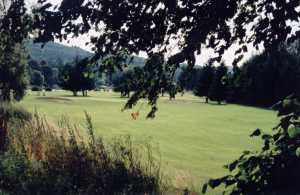

|
|||||||||
|
|
|
|
|
|
|
|
|
|
|
|
April 2nd 1312 |


|
Duel for a coat of arms
The North Inch, perfect for duelling Picture by Donald Paton In 1311 Bruce succeeded in capturing the town of Perth and the large English garrison within it. One of those captured was an English knight named Hugh Harding who remained within the town awaiting a ransom to be paid for his release. Some six months after the capture he complained to the King that a Scottish knight, William de Saintlowe bore his coat armorial, a device consisting of three golden hares running, on a red field, with white collars about their necks. This device, he claimed, was identical to his own and should not be worn by de Saintlowe. It was the sort of quarrel where evidence of prior claims was difficult to substantiate, and as the quarrel was bitter and presumably judged to be important, it was eventually agreed that the two should settle the dispute by recourse to arms. Accordingly, on April 2nd the two men appeared on the North Inch and made an oath before the King that neither carried any secret weapons, magic stones or charms and that they both placed their confidence only in God and the rightness of their cause. Having delivered themselves of these necessary platitudes, the trumpets sounded and the battle commenced. De Saintlowe was eventually defeated and the Englishman was granted letters patent from the King himself that all and sundry should know of his triumph. “Robert, by the Grace of God, King of Scotland. To all whom the present letter should come, greeting: Seeing that we permitted on the day of the writing of this letter, a duel at our town of Perth, between Hugh Harding, an Englishman, and William de Saintlowe, a Scotsman, regarding their armorial bearings… And when the duel was finished, the aforesaid William at last avowed himself vanquished, and altogether for himself, and for his heirs, for ever, gave up and resigned before our presence, and in our hearing, to the aforesaid Hugh, the aforesaid arms, with all the honour, triumph and victory. Wherefore we,… have decreed, that the aforesaid Hugh Harding, and his heirs, have and hold, enjoy and bear the aforesaid arms wholly free from the false accusation, disturbance, contradiction and opposition of the aforesaid William, or his heirs. In testimony of which, at our said town of Perth, on the second day of April, in the seventh year of our reign, and in the year of the Lord 1312, we have caused this letter to be made known.” It was no doubt a tale for Hugh Harding to tell his children when he eventually returned to England. |

